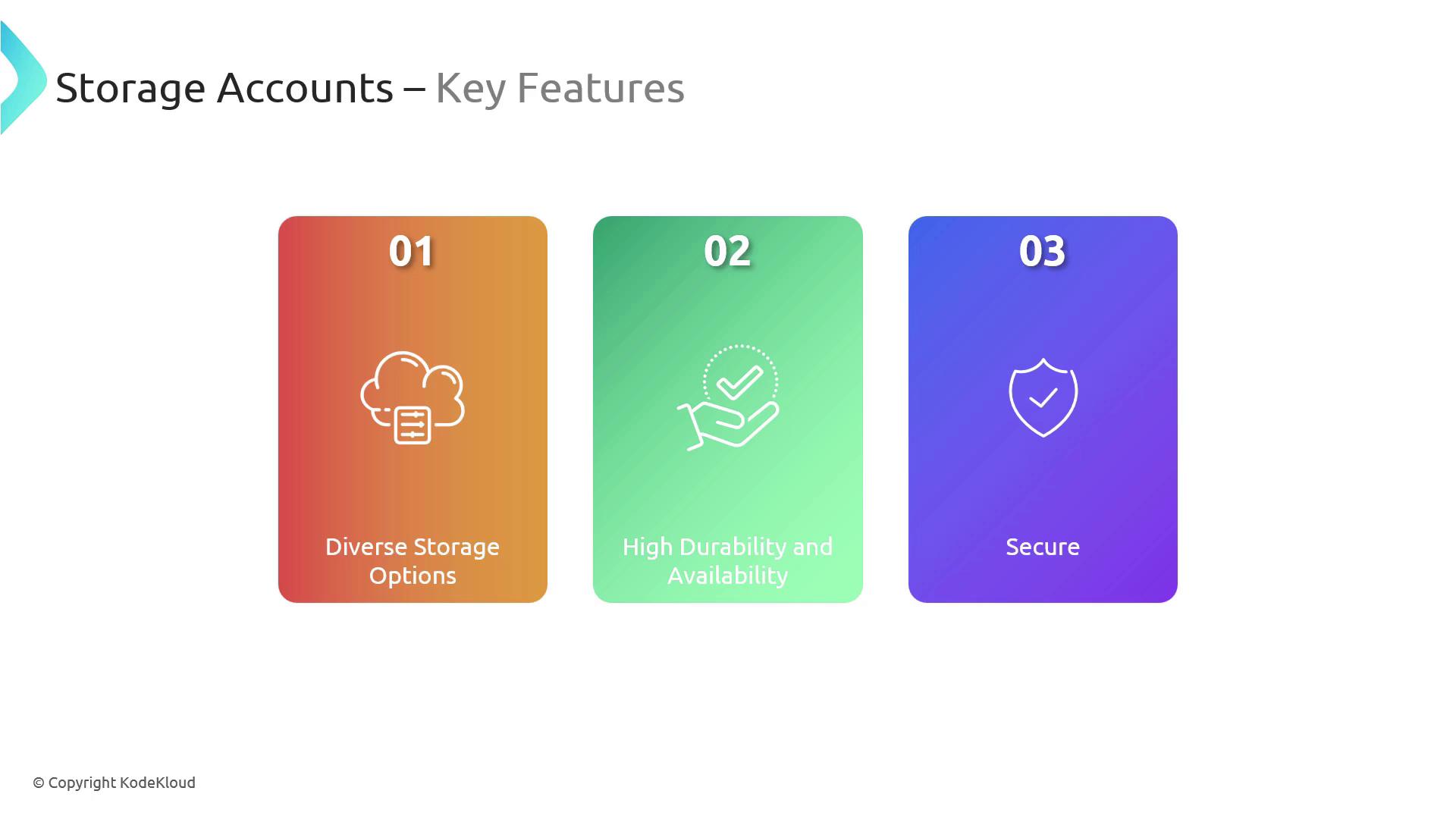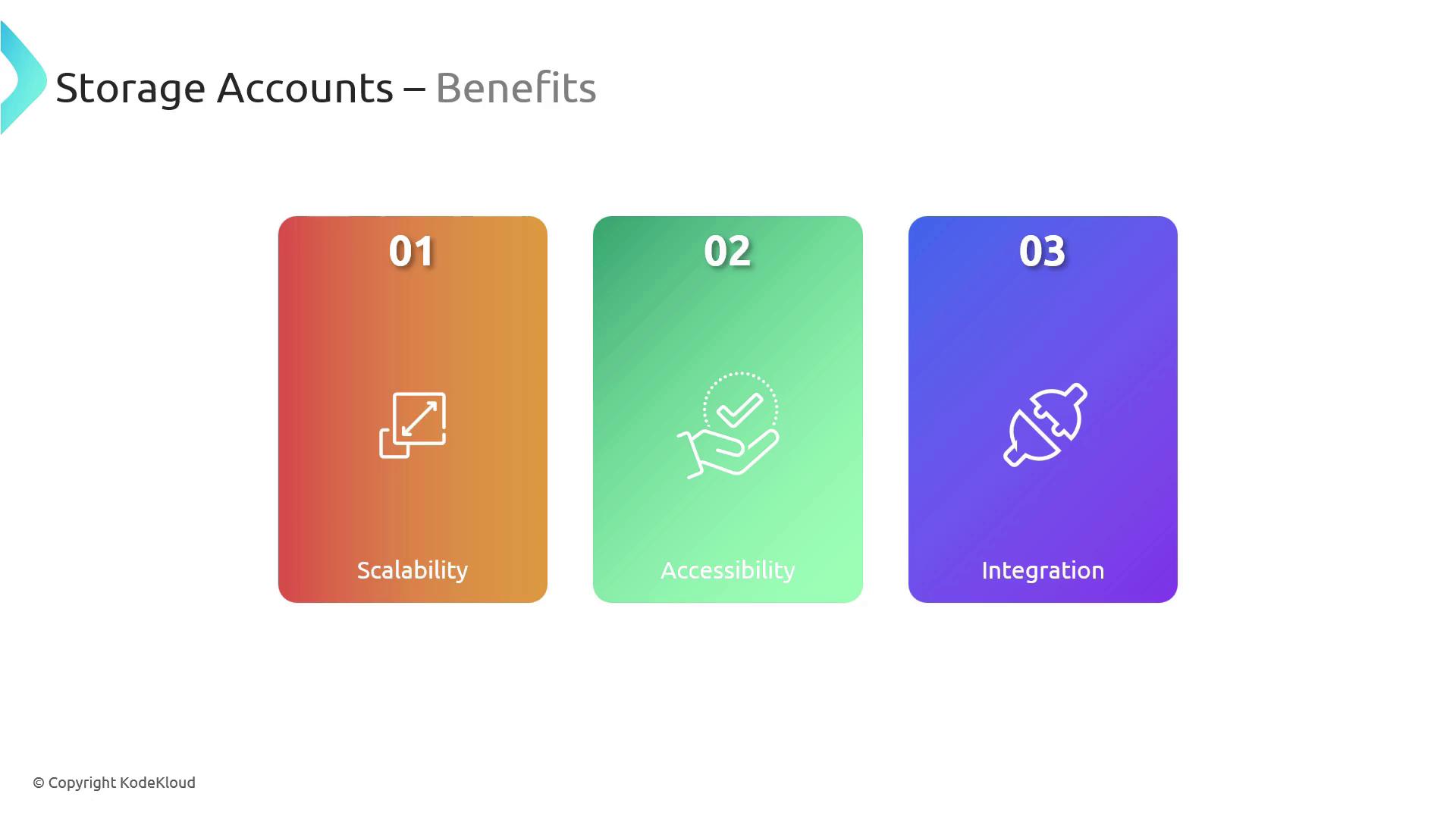AZ900: Microsoft Azure Fundamentals
Storage
Storage Accounts
Azure Storage Accounts provide a secure, scalable, and highly available solution for storing large volumes of data in the cloud. Whether you're a developer, data scientist, or business analyst, having a solid understanding of Azure Storage Accounts is essential for harnessing the full potential of Azure.
At its core, an Azure Storage Account is a cloud-based resource that hosts a variety of storage services. These services allow you to handle different data types effectively. In the following sections, we will discuss the key features, benefits, use cases, and redundancy options associated with Azure Storage Accounts.
Key Features
Azure Storage Accounts offer a robust set of features, making them a versatile choice for modern applications.
Diverse Storage Options
Azure provides a range of storage services that can accommodate your data storage needs:
- Blob Storage: Ideal for storing images, videos, documents, and other unstructured data.
- File Storage: Delivers managed file shares for secure data access.
- Queue Storage: Supports message queuing to facilitate asynchronous communication between components.
- Table Storage: Provides a scalable NoSQL datastore for semi-structured data.
Note
Azure Storage Accounts host multiple services under one umbrella, giving you the flexibility to choose the right storage solution based on your data requirements.

High Durability and Availability
Data stored in an Azure Storage Account is automatically replicated across multiple facilities. This replication ensures that your data remains protected against hardware failures, natural disasters, or other unexpected outages.
Robust Security
Security is a major focus for Azure. Storage Accounts come equipped with advanced security measures, including encryption both in transit and at rest, as well as fine-grained access controls to help protect your data.
Benefits of Using Storage Accounts
Azure Storage Accounts are designed to address the needs of modern applications. Below are some key benefits:
Scalability
Azure Storage Accounts are built to grow as your application's data requirements increase. Whether you're handling gigabytes or petabytes of data, Azure scales seamlessly to meet your needs.
Global Accessibility
Data in Azure is accessible from anywhere in the world using HTTP or HTTPS protocols. This means that your applications and users can securely access data, regardless of location.
Seamless Integration
Storage Accounts integrate effortlessly with other Azure services and a wide range of third-party applications. This integration helps streamline workflows and improves overall operational efficiency.

Use Cases
Azure Storage Accounts are versatile and suitable for a variety of scenarios. Consider the following common use cases:
- Versatile Application Support: For multimedia-rich websites and applications, Azure Storage provides a reliable solution to store assets like videos, images, and documents. For instance, when Bella Innovation required robust asset storage for their website, Azure Storage met their needs efficiently.
- Analytics and Big Data Processing: Host and process large datasets using Azure’s advanced analytics services.
- Log Management and Disaster Recovery: Maintain comprehensive logs and reliable backups to ensure your systems are prepared for any disaster.
- Unstructured Data Storage: Utilize Azure Storage as a reliable repository for storing and managing unstructured data.
- Messaging and NoSQL Storage: Support back-end systems for messaging applications and NoSQL databases.
- Mobile Applications: Serve as a backend for mobile app data, ensuring real-time ingestion and retrieval.
- IoT Solutions: Efficiently manage large-scale data ingestion and processing for IoT devices.
![]()
The applications for Azure Storage Accounts are extensive. Wherever you require secure, scalable, and reliable storage, Azure Storage Accounts offer an ideal solution.
Redundancy Options
One of the significant advantages of using Azure Storage Accounts is the high level of data availability provided by various redundancy configurations. These options help ensure that your data remains accessible even during disruptions or outages.
Note
When choosing a redundancy option, consider your business continuity requirements and the geographical distribution of your users.
Understanding the redundancy options is crucial for optimizing data durability and availability. Explore the configurations to determine which best meets your organizational needs and service level agreements.
For additional insights and best practices on Azure Storage, visit the Azure Documentation.
Watch Video
Watch video content